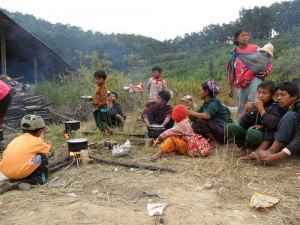Posts Tagged ‘Refugee Repatriation’ (20 found)
Position on the Repatriation of Refugees from Burma
After the Karenni Refugee Committee (KnRC) organized three workshops on September 20-21st, November 9th and October 8-10th, attended by representatives of KnRC, Karenni community based organizations and religious leaders, the groups agreed on a common position paper on refugees’ repatriation as follow […]
• • •The Situation of Refugees on the Thai-Burma Border
This briefing paper looks at the current situation in Burma’s ethnic areas, the areas that refugees would be returned to, and shows how the conditions are not yet in place for their return. Furthermore, it highlights the need for the refugees to be included in these processes and lays out refugees and community-based organization’s preconditions for their return […]
• • •Refugee Return Only with Consent, Safety and Dignity
 Anxiety and uncertainty has been building among refugees in Thailand’s camps regarding possible repatriation to Burma. While there are many actors who feel they have a major role in the decision-making of when and how this process will take place, none are more important than the refugees themselves. Thus, the release of a position paper by a group of Karen Community Based Organizations (KCBOs), many of whom work directly with communities inside Thailand’s refugee camps, is an important first step in making sure that it is those affected who determine the path that their lives will take.
Anxiety and uncertainty has been building among refugees in Thailand’s camps regarding possible repatriation to Burma. While there are many actors who feel they have a major role in the decision-making of when and how this process will take place, none are more important than the refugees themselves. Thus, the release of a position paper by a group of Karen Community Based Organizations (KCBOs), many of whom work directly with communities inside Thailand’s refugee camps, is an important first step in making sure that it is those affected who determine the path that their lives will take.
The position paper outlines pre-conditions for refugees’ return to Burma and the processes that must be followed once those preconditions have been met. The position paper is timely in that it was released the same week that the Thai National Security Council released a statement indicating that refugees will return within a year. Burma, the statement reads, “is clearing landmines along the borders, preparing to build shelters and other infrastructure… to be ready within one year.” […]
• • •Ad Hoc and Inadequate
Thailand’s Treatment of Refugees and Asylum Seekers
Karen Community Based Organizations Release Position Paper on Refugees’ Return
Today a grouping of Karen Community Based Organizations (KCBOs) released their collective position in response to recent news about the repatriation of refugees. The position paper outlines the pre-conditions and processes necessary for a successful and voluntary return of refugees from several camps along the Thai-Burma border […]
• • •Karen Community Based Organizations’ Position on Refugees’ Return to Burma
This is a preliminary working paper prepared by the Karen Community Based Organizations (KCBOs) concerned with refugees’ repatriation and return to Burma […]
• • •“Even I Am a Refugee, Listen to My Voice”
The Karen Women Organization (KWO) welcomes another World Refugee Day. For this year the KWO theme is “Even I Am a Refugee, Listen to My Voice”. This theme was chosen by refugee women participants in a KWO training on Refugee Rights and Repatriation held this month […]
• • •Potential Camp Closures in Thailand Put Refugees from Burma at Risk
In early April 2011, authorities in Thailand announced their intention to close nine refugee camps along the Thai-Burma border, which would send more than 140,000 refugees back to Burma. That includes 100,000 refugees from Burma who have been officially registered and an estimated 53,000 who have not. This decision has received heavy criticism from local and international human rights groups. The Thai authorities have not indicated when they intend to repatriate the refugees.
The announcement of camp closures comes only 6 months after the fraudulent elections in Burma and the formation of a new parliament composed predominantly of former military officers and those sympathetic to the regime. Since the elections, there has been no opening of political space, conflict in Eastern Burma has intensified and human rights abuses continue throughout the country. Any suggestion that refugees and asylum seekers along the Thai-Burma border could be safely returned to their country in the near future is a complete unreality […]
• • •Thailand Must Promote Human Security in Burma and ASEAN
Today, Thai Prime Minister Abhisit Vejjajiva embarked on his first official trip to Burma. He is expected to be briefed on the SPDC’s plans after the elections and discuss the situation of Daw Aung San Suu Kyi, other prisoners and ethnic minority groups, while economic interests also appear to be a main focus of the meetings.
Abhisit’s visit is timely in light of Foreign Minister Kasit Piromya’s comment last week regarding a plan to repatriate refugees and intellectuals back to Burma after the elections. The statement raised serious concerns for the safety of those who could be repatriated, many of whom could be met with fines, arbitrary arrests, and even torture for leaving the country. Those who have been involved in political activities could face particularly harsh repercussions […]
• • •Thai Foreign Ministry Spokesperson refutes speculation on repatriation of Myanmar displaced persons
On 6 October 2010, when asked by reporters whether Thailand plans to repatriate Myanmar displaced persons after the elections, Ms. Viman Kidchob, Director-General of the Department of Information and Foreign Ministry Spokesperson said that there was a misinterpretation of Foreign Minister Kasit Piromya’s remarks during his visit to New York, and that there existed no such plan […]
• • •








 All posts
All posts